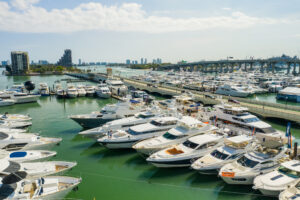Essential Tips for First-Time Boat Buyers: Navigating Your Way to a Successful Purchase

Embarking on the journey of buying your first boat is a thrilling experience, filled with dreams of weekend fishing trips, watersports with family, and serene sunset cruises. However, the process can also be overwhelming, especially for newcomers. This comprehensive guide aims to ease your path by providing detailed tips to help you make an informed and confident purchase. By the end of this article, you’ll have a clear understanding of the steps involved in buying a boat and be well-prepared to make your first purchase.
Determine Your Boating Needs
Before diving into the boat-buying process, it’s crucial to assess how and where you plan to use your boat. Your primary use will guide you in choosing the right type of boat that fits your lifestyle and needs. Consider the following options:
– Fishing: A center console or a sport fisher is ideal for those planning to fish regularly. These boats are equipped with fishing amenities like rod holders and bait wells.
– Family Fun: A bowrider or a pontoon boat offers ample seating and comfort for family outings, making them perfect for watersports and leisure cruises.
– Overnight Trips: For longer voyages and overnight stays, a cruiser or a yacht provides the necessary amenities, including sleeping quarters, a kitchen, and a bathroom.
By pinpointing your needs, you can narrow down your options and focus on boats that align with your lifestyle. This step is essential in ensuring you choose a boat that you will enjoy for years to come.
Set a Realistic Budget
Buying a boat involves more than just the sticker price. It’s crucial to factor in ongoing costs to ensure you can afford all aspects of boat ownership without financial strain. Consider the following expenses:
– Maintenance: Routine upkeep, such as engine servicing, hull cleaning, and minor repairs, is necessary to keep your boat in top shape.
– Insurance: Protects your investment and covers liabilities. Boat insurance typically includes coverage for damage, theft, liability, and medical expenses.
– Fuel: A regular expense that depends on your usage. Larger boats and those with powerful engines consume more fuel.
– Storage: Costs for docking or dry storage when the boat is not in use. Depending on your location, storage can be a significant expense.
– Financing: If taking out a loan, include monthly payments in your budget. Interest rates and loan terms vary, so shop around for the best deal.
Creating a detailed budget ensures you can afford all aspects of boat ownership and helps you avoid unexpected financial strain.
New vs. Used Boats
Deciding between a new or used boat is a significant choice that impacts your budget and the overall buying experience. Here are some pros and cons to consider:
– New Boats: Offer the latest technology, customization options, and warranties. They come with fewer risks but at a higher price. The peace of mind that comes with a new boat can be worth the extra cost for many buyers.
– Used Boats: More affordable but may require more maintenance. A thorough inspection by a professional surveyor is essential to identify any potential issues. Used boats can be an excellent option for those looking to save money while still getting a great boat.
Consider Financing and Insurance
Explore various financing options to find the best fit for your financial situation. Here are some common options:
– Boat Loans: Offered by banks and credit unions, these loans are tailored for boat purchases. They typically require a down payment and have interest rates based on your creditworthiness.
– Personal Loans: Another option, though terms may vary. Personal loans can be used for various purposes, including buying a boat.
– Home Equity Loans: Can be used if you have significant equity in your home. These loans often offer lower interest rates but come with the risk of using your home as collateral.
In addition to financing, securing comprehensive insurance is crucial to protect your investment and ensure safety on the water. Boat insurance typically covers damage, theft, liability, and medical expenses. Shopping around for quotes can help you find the best coverage at an affordable rate.
Hire a Professional Surveyor
Especially when buying a used boat, hiring a professional surveyor is invaluable. A surveyor inspects the boat thoroughly, providing a detailed report on its condition. This helps you avoid costly surprises and ensures the boat is worth the investment. A professional survey can reveal hidden issues that may not be apparent to an untrained eye, giving you peace of mind and confidence in your purchase.
Seatrials (aka Test Drive the Boat)
Always arrange a sea trial before finalizing your purchase. Testing the boat allows you to:
– Assess Performance: Check how it handles different speeds and maneuvers. Pay attention to the engine’s responsiveness, the boat’s stability, and its overall performance in various conditions.
– Comfort: Ensure it meets your comfort expectations. Consider the seating arrangement, space, and amenities.
– Functionality: Verify all systems and features work as advertised. Test the navigation systems, lights, and any other equipment on board.
Choose a Reputable Dealer
A trustworthy dealer can make a significant difference in your boat-buying experience. Look for dealers with:
– Good Reviews: Check online reviews and ask for recommendations from fellow boaters. A dealer with a solid reputation is more likely to provide excellent service and support.
– Knowledge: They should be able to answer your questions and provide guidance. A knowledgeable dealer can help you choose the right boat and offer valuable insights into boat ownership.
– Support: Ongoing support after the purchase is crucial. Ensure the dealer offers maintenance services and can assist with any issues that arise.
Negotiate the Price
Research the fair market value of the boat you’re interested in to be well-prepared for negotiations. Keep in mind:
-Boat’s Age and Condition: These significantly affect value. A newer boat in excellent condition will command a higher price than an older boat with wear and tear.
– Included Accessories: Ensure all agreed-upon accessories are part of the deal. This can include safety equipment, electronics, and additional features.
Don’t hesitate to walk away if the price doesn’t match the boat’s value or your budget. Negotiation is a normal part of the buying process, and being prepared can help you secure a better deal.
Understand Warranties and Documentation
Ensure all details of the transaction are accurately reflected in the sales contract. Understand the terms of any warranties and keep all related documentation safe. This is especially important for new boats, but also inquire about transferable warranties for used boats. Knowing what is covered and for how long can save you from unexpected expenses in the future.
Learn Boating Laws and Safety
Before hitting the water, familiarize yourself with local boating laws and regulations. Taking a boating safety course is highly recommended, covering topics such as:
– Navigation Rules: Essential for safe operation. Understanding right-of-way rules, buoy markers, and navigational aids is crucial for safety.
– Safety Equipment: Required gear and proper usage. This includes life jackets, fire extinguishers, flares, and other essential safety equipment.
– Emergency Procedures: How to handle emergencies on the water. Knowing how to respond to situations like capsizing, fires, or medical emergencies can save lives.
Get Your Boat Delivered by a Transporter
If you’re buying a boat from a distant location, arranging professional transport can save you time and ensure safe delivery. Professional boat transporters handle:
– Logistics: Secure the boat and navigate legal requirements. They take care of permits, route planning, and any necessary inspections.
– Delivery: Ensure it reaches your desired location safely. Transporters use specialized equipment to protect your boat during transit.
When choosing a transporter, look for those with:
– Experience: Particularly in boat transport. An experienced transporter will know how to handle various types of boats and any potential challenges.
– Insurance and Permits: Ensure they have the necessary coverage and permissions. Proper insurance protects your boat during transit, and permits ensure compliance with regulations.
– Customer Reviews: Positive feedback from previous clients. Reviews can give you an idea of the transporter’s reliability and service quality.
Professional transport services offer peace of mind, allowing you to enjoy your new boat without the hassle of arranging transportation yourself. This is especially valuable for larger boats or when moving the boat long distances. Get your free QUOTE today from Smitty’s Haulin’, Inc.
Conclusion
Buying your first boat is an exciting adventure, but it’s essential to approach the process with thorough research and preparation. By following these tips, you can navigate the boat-buying journey with confidence, ensuring you choose a boat that fits your needs and budget. Whether you’re dreaming of fishing trips, family outings, or long cruises, the right boat can make those dreams a reality. Enjoy your new adventures on the water!
Additional Resources
For further reading and detailed information, consider the following sources:
– [BoatingWorld](https://www.boatingworld.com): Offers a wealth of information on boating tips, reviews, and guides.
– [Nautical Ventures](https://www.nauticalventures.com): Provides insights into boat buying, including financing and insurance options.
– [Lowe Boats](https://www.loweboats.com): Features a variety of boats and tips for first-time buyers.
– [Boat Mavens](https://www.boatmavens.com): A comprehensive resource for boat buying guides and marine transport.
– [Boating Magazine](https://www.boatingmag.com): Covers a wide range of boating topics, including safety, maintenance, and buying guides.


